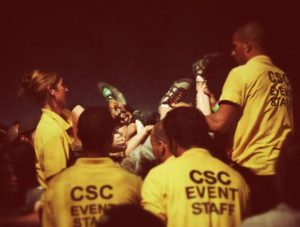In the pits
The history of concerts and the development of health and safety has been well documented over the years; including working at the front of stage in a stewarding capacity. Through the use of orchestra pits, to scaffolding poles, demountable barriers to college courses, safety has developed at a steady pace.
We are now at a stage where the majority of crowd management providers follow the same processes and training programs for their staffing of a front of stage. In the UK, companies have developed training programs in conjunction with universities to establish a minimum level of training for stewards working at the front of stage. It should be pointed out that this is a minimum though.
As with all commercial ventures, companies are now using this training as a selling point for their services. I am sure that each company’s courses have its own unique pointers and that they achieve the standard of the required qualification; this I would not bring into question. But, is this truly a reflection of the ability of the staff working in that area. You could inform a prospective production company for a show that you have 300 staff that have passed this training qualification; but how many work in these areas on a regular basis? Would you say that when you passed your driving licence that you where a proficient driver? Or would that be years later when you are driving every day. The same could be said of the inexperience of youth when it comes to driving; does a younger pit crew make a better pit crew? There is also the age old security image, the 6ft gorilla standing in front of the stage to stop anyone coming over.
It cannot be argued that in the United Kingdom; as with so many aspects of crowd management the development of training courses have raised the standards at the front of stage. As with all training courses though, are we pulling the wool over our eyes? When the UK introduces the security licensing system through the SIA, it assisted in raising the standards of security and reduce the associated criminal element. With the introduction of training and legislation, the personnel that where already performing the role where first to pass and we saw a high delivery of the system. Could the same be said now though? When you can go to night school to sit a training course to pass an exam; does this mean that they can perform the role? Of course, I am bringing into question the provision of security licences to individuals that are clearly not able to perform the role; but it does allow them to increase their income. We are at a stage where it is becoming pointless? Can this also be said about the front of stage training?
I do not believe that this training has become pointless; far from it. I am a firm believer in a strong educational platform to build on. I do believe that it is being used as a promotional tool though, where ability is exchanged for facts, figures and certificates. I also believe that it curtails development and innovation. As with all practices that set a bench mark, the focus is on achieving the bench mark; not pushing the bar higher. The provision of any training for stewards should always be encouraged and the sharing of knowledge be encouraged. When do we let these trained staff practice though?
In your area I am sure you can name the venues that would require front of stage staff. This is a smaller number of staff than the amount trained. So who gets used? Do staff get rotated, profiled to match the audience, over manned to allow for hands on training or does the small number of staff get used at all events? Having worked in venues over a period of time from clubs to arenas, I would suggest that it is the latter and a small number of staff that are used for the shows on a regular basis, this being based on what I have seen.
So where do the greater number of staff get to practice the training they have been given? Would it be wrong of me to suggest that it is at multi stage music festivals? I have tried to imagine where do we have to deploy vast numbers of front of stage safety staff. Does this mean that we have a smaller amount of experienced, trained staff in with a greater number of trained but inexperienced? This has always been the case, but are we now blurring this by providing facts and figures for staff that have been trained, but this has been classroom based? In the day and age of health and safety, accountability and blame culture, is the provision of facts and figures for training course blurring out the true picture.
Years ago a promoter would not have even thought about the training of the pit crew, but now where they can be sued for a crowd surfer being dropped, we have a different story. There are signs printed saying no crowd surfing, bands are informed not to encourage this and stewards have to sit a course on what to do with a crowd surfer. Like so many other elements of live music events, we treat everyone with kid gloves. The safest place to crowd surf would have to be a well established music venue, which is busy with several concerts a week. It is in these venues that we see the establishment of a pit crew.
Crew – definition
“A crew is a group of people with special technical skills who work together on a task or project. “
There is a vast difference between a pit crew and front of stage staff. As the definition suggests, a pit crew work together. They are a team that is built up over a course of time and they know what each member is doing without looking at them, know where they are and have the same mind set. This is all controlled and directed by the Pit Boss/Supervisor. A good pit crew, are like a machine when front of stage, the pit boss sets the mindset and fine tunes the machine.
Although you can transfer this crew to a larger pit, they are never as effective. There is the introduction of unknown – that being the person standing next to you. The experienced member of staff is going to question the ability of the person they don’t know and that brings about doubt. Over multiple days though, this experience is passed on and the less experienced person gains from working alongside those that are experienced. Let’s just hope that the next time they are front of stage is not the same event 12 months later.
Establishing a pit crew is like setting up an apprentice; we all have to start somewhere. It is up to the pit boss how the new member is inducted and serves their time, till it is deemed they are established as part of the team. Never underestimate how hard it is to establish a pit crew. It is not an easy task to find a group of individuals and mould them into a team that can work together and it is even harder when established to induct new members. It is worth the effort though, good pit crews are well known in their areas and in the long run that assists making your job easier.
Can any provider of staff to the front of stage area, hand on heart say for large scale festivals, all their staff are experienced? I would suggest that this is unlikely. For some of the larger companies, I am sure a little thought and effort could rectify this though.
For promoters the same could be said, a bit of realism. Look at your provider and think about what they are telling you; is it a true reflection or a sales pitch? Year in year out, there are only so many venues that use front of stage staff…..who provides for them? That gives you a number of possible available staff. But, what if your provider does not work in venues, year in year out; where do their trained staff come from? Is it the same staff from last year event?
In this I am suggesting, that sometimes the old ways are the best. Although education can never be frowned upon, sometimes on the job learning can deliver greater results. It may sound old fashioned, but I am sure those that are established in the workings of a pit crew would agree. Also, that maybe we all need to be a bit more honest with one another and stop using facts and figures to blur reality.
Workingwithcrowds.com







